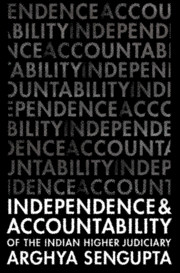Book contents
- Frontmatter
- Dedication
- Contents
- Acknowledgements
- List of Abbreviations
- List of Cases
- List of Statutes
- 1 Introduction
- PART I THE INDIAN EXPERIENCE
- PART II A CONCEPTUAL ANALYSIS
- 5 Judicial Accountability
- 6 Judicial Independence
- 7 In Search of an Effective Judiciary: A Doctrinal Reconciliation of Judicial Independence and Accountability
- PART III TYING THE STRANDS
- Epilogue: The Moment the Judiciary Came Out
- Appendix Post-Retirement Employment of Judges in Government-Appointed Positions
- Bibliography
- Index
7 - In Search of an Effective Judiciary: A Doctrinal Reconciliation of Judicial Independence and Accountability
from PART II - A CONCEPTUAL ANALYSIS
Published online by Cambridge University Press: 26 April 2019
- Frontmatter
- Dedication
- Contents
- Acknowledgements
- List of Abbreviations
- List of Cases
- List of Statutes
- 1 Introduction
- PART I THE INDIAN EXPERIENCE
- PART II A CONCEPTUAL ANALYSIS
- 5 Judicial Accountability
- 6 Judicial Independence
- 7 In Search of an Effective Judiciary: A Doctrinal Reconciliation of Judicial Independence and Accountability
- PART III TYING THE STRANDS
- Epilogue: The Moment the Judiciary Came Out
- Appendix Post-Retirement Employment of Judges in Government-Appointed Positions
- Bibliography
- Index
Summary
The quest for judicial independence has long obsessed public law academics, judges and political theorists. The historical struggles to establish independent judiciaries, its prominent espousal in constitutional arrangements and its centrality to judicial functioning have made such obsession inevitable. As a result, whether a particular judicial system in a country is independent or not is often the sole lens through which existing constitutional arrangements as they affect the judiciary are analysed. This ‘one-dimensional holism’, though understandable, is limiting. Especially when used to analyse or shape the structuring and functioning of courts, it is closed to the other factors that are responsible for ‘an effective judiciary’. We most certainly want the judiciary to be independent, but we also want the judiciary to be competent, impartial and sufficiently powerful to check government and possess a range of other virtues.
To briefly substantiate this argument—in Indian constitutional jurisprudence, the Supreme Court has focused solely on judicial independence amongst all normative values, when interpreting provisions relating to appointment of judges to the higher judiciary. The justification for such an interpretive exercise is traced to the intention of the drafters of the Constitution. However, if the intention of the drafters is carefully scrutinised, an alternative touchstone for interpretation can be found—preserving the institutional dignity and high status of the judiciary. This is what, one might argue, guided members of the Constituent Assembly to make the president the appointing authority and the chief justice of India a mandatory consultee for all appointments to the higher judiciary. At the same time, this is why, as a matter of fact, proposals for legislative ratification of proposed appointees were rejected, since it was felt that such voting would reduce the esteem in which the higher judiciary ought to be held. Prima facie, this argument seems plausible. But like the argument that views provisions on appointments and transfers solely from the perspective of judicial independence, it would be incorrect. This is because as Prakash and Smith point out ‘appealing to one among many competing commitments in a “holistic” way and then construing a provision to further that value is no way to respect the constitutional design’. Likewise, a carefully crafted constitution more often than not envisages balance between factors, trade-offs and compromises—to not look at the conspectus of relevant factors in a constitutional scheme is myopic.
- Type
- Chapter
- Information
- Independence and Accountability of the Higher Indian Judiciary , pp. 168 - 204Publisher: Cambridge University PressPrint publication year: 2019



